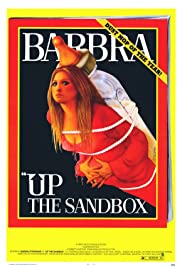
UP THE SANDBOX
US, 1972, 98 minutes, Colour.
Barbra Streisand, David Selby.
Directed by Irving Kershner.
Barbra Streisand fans will probably enjoy this small comedy about a modern housewife, an educated woman who enjoys being s wife and mother, but finds the pressure of being a subordinate support to a professional husband disturbing - so much so that she floats off into wild, adventurous fantasies or dreams of her fears (providing an opportunity for comedy, farce or pathos). Barbra Streisand, so talented in herself, portrays fairly convincingly the suburban wife and mother in a more restrained performance. Her husband, Dave Selby, is reasonable, but her mother is a trial - both in reality and in dreams. A mixture of pleasant, average, domestic comedy, Walter Mitty fantasy and points made about women.
1. How enjoyable a film, a Barbra Streisand vehicle - her style, comic impact, entertainment value, message?
2. The significance of the title, the reference to housewives, children? Housewives' Lib.? A useful entertaining message film about women and their place in society, rights? The basic points being made - how convincingly?
3. The mad world of the ordinary housewife? The oppression of the housewife in her place? How well did the screenplay sympathise with Margaret, her ordinary way of life, her need for change and development? Her rights? The imaginative interpretation of Margaret and her needs - and of Margaret's imagination?
4. Barbra Streisand interpretation of Margaret - her relationship with Paul: the sequences at home, his academic work, parties, his secretary, the decisions about moving from Manhattan etc.? Margaret's pregnancy and her decision to tell Paul or not? Abortion? Margaret and her relationship with her mother - love and clash, with her father, the rest of the family? Margaret and her own possibilities - instead of being her husband's typist, proof-reader, support? Women identifying with Margaret as a character, and with the issues?
5. The portrait of Paul - in comparison with Margaret? His work and his abilities, seeing him at work with his secretary, the domestic sequences - love of the children, coming home, meals, lovemaking, clashes? At intellectual parties? His response to Margaret's pregnancy, looking after the children? Hope for the future?
6. The sketch of the children and the validity of the domestic sequences?
7. Margaret's imagination - her coping with reality, her breaking down? Her discussion with the women in the park, with her friends? Her Inability to cope the place of the fantasies and their significance? As the other side of her character, compensation, dreams?
8. The adventure in her imagination: the encounter with Castro and her work as a journalist, the seduction, the dancing? The choosing of Castro for adventure? Her being involved with the black militant group, the revolutionaries blowing up the Statue of Liberty, the overtones of the popular spy adventures of the time? Her presence in Africa and the anthropology studies and rites - the women warriors? The association of Africa with childbirth?
9. The feminine themes in her fantasies - the role of the woman reporter, the masculine-feminine relationship of Castro and herself, the ridiculous revelation that Castro was a woman? Her place with the black revolutionaries? Her presence in Africa and childbirth and death?
10. Her fantasies in which she was victim - the secretary coolly talking about the fulfilling relationship with her husband? Her mother and the wire cutters with the door? The long sequence of the party, the anniversary, the speeches, the playing of the piano, the discussion about moving, the home movies - and the fantasy argument with her mother, the violent clash, her mother's face in the cake?
11. The reality and fantasy blend towards the end? Margaret's wanting to leave the fashionable party, tell the truth to Paul? Her visit to the doctor? The fantasy of the abortion, Paul rescuing her? Her need for a day by herself? The changing of roles? The final going off by herself - reality or fantasy?
12. The film as domestic comedy, the Jewish comic tones? The message in the film - communicated by the style, imposing itself on the audience? The message by involving the audience in the process of Margaret's life and imagination? The humour of the message, the acid tones? An effective message film?